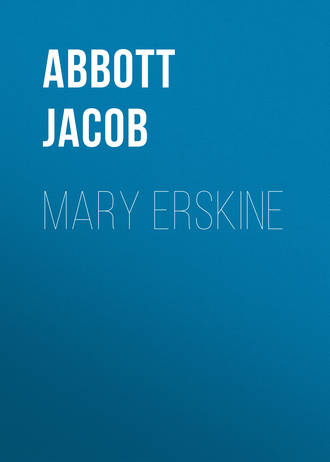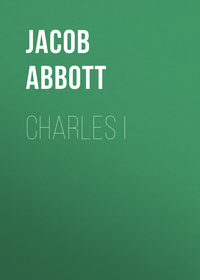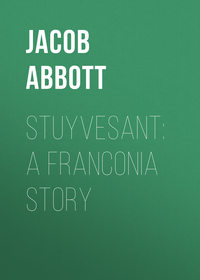
Mary Erskine
On the back side of the room, in one corner, was the bed. It was supported upon a bedstead which Albert had made. The bedstead had high posts, and was covered, like the window, with curtains. In the other corner was the place for the loom, with the spinning-wheel between the loom and the bed. When Mary Erskine was using the spinning-wheel, she brought it out into the center of the room. The loom was not yet finished. Albert was building it, working upon it from time to time as he had opportunity. The frame of it was up, and some of the machinery was made.
Mary Erskine kept most of her clothes in a trunk; but Albert was making her a bureau.
Instead of finding it lonesome at her new home, as Mrs. Bell had predicted, Mary Erskine had plenty of company. The girls from the village, whom she used to know, were very fond of coming out to see her. Many of them were much younger than she was, and they loved to ramble about in the woods around Mary Erskine's house, and to play along the bank of the brook. Mary used to show them too, every time they came, the new articles which Albert had made for her, and to explain to them the gradual progress of the improvements. Mary Bell herself was very fond of going to see Mary Erskine,—though she was of course at that time too young to go alone. Sometimes however Mrs. Bell would send her out in the morning and let her remain all day, playing, very happily, around the door and down by the spring. She used to play all day among the logs and stumps, and upon the sandy beach by the side of the brook, and yet when she went home at night she always looked as nice, and her clothes were as neat and as clean as when she went in the morning. Mrs. Bell wondered at this, and on observing that it continued to be so, repeatedly, after several visits, she asked Mary Bell how it happened that Mary Erskine kept her so nice.
"Oh," said Mary Bell, "I always put on my working frock when I go out to Mary Erskine's."
The working frock was a plain, loose woolen dress, which Mary Erskine made for Mary Bell, and which Mary Bell, always put on in the morning, whenever she came to the farm. Her own dress was taken off and laid carefully away upon the bed, under the curtains. Her shoes and stockings were taken off too, so that she might play in the brook if she pleased, though Mary Erskine told her it was not best to remain in the water long enough to have her feet get very cold.
When Mary Bell was dressed thus in her working frock, she was allowed to play wherever she pleased, so that she enjoyed almost an absolute and unbounded liberty. And yet there were some restrictions. She must not go across the brook, for fear that she might get lost in the woods, nor go out of sight of the house in any direction. She might build fires upon any of the stumps or logs, but not within certain limits of distance from the house, lest she should set the house on fire. And she must not touch the axe, for fear that she might cut herself, nor climb upon the wood-pile, for fear that it might fall down upon her. With some such restrictions as these, she could do whatever she pleased.
She was very much delighted, one morning in September, when she was playing around the house in her working frock, at finding a great hole or hollow under a stump, which she immediately resolved to have for her oven. She was sitting down upon the ground by the side of it, and she began to call out as loud as she could,
"Mary Erskine! Mary Erskine!"
But Mary Erskine did not answer. Mary Bell could hear the sound of the spinning-wheel in the house, and she wondered why the spinner could not hear her, when she called so loud.
She listened, watching for the pauses in the buzzing sound of the wheel, and endeavored to call out in the pauses,—but with no better success than before. At last she got up and walked along toward the house, swinging in her hand a small wooden shovel, which Albert had made for her to dig wells with in the sand on the margin of the brook.
"Mary Erskine!" said she, when she got to the door of the house, "didn't you hear me calling for you?"
"Yes," said Mary Erskine.
"Then why did not you come?" said Mary Bell.
"Because I was disobedient," said Mary Erskine, "and now I suppose I must be punished."
"Well," said Mary Bell. The expression of dissatisfaction and reproof upon Mary Bell's countenance was changed immediately into one of surprise and pleasure, at the idea of Mary Erskine's being punished for disobeying her. So she said,
"Well. And what shall your punishment be?"
"What did you want me for?" asked Mary Erskine.
"I wanted you to see my oven."
"Have you got an oven?" asked Mary Erskine.
"Yes," said Mary Bell, "It is under a stump. I have got some wood, and now I want some fire."
"Very well," said Mary Erskine, "get your fire-pan."
Mary Bell's fire-pan, was an old tin dipper with a long handle. It had been worn out as a dipper, and so they used to let Mary Bell have it to carry her fire in. There were several small holes in the bottom of the dipper, so completely was it worn out: but this made it all the better for a fire-pan, since the air which came up through the holes, fanned the coals and kept them alive. This dipper was very valuable, too, for another purpose. Mary Bell was accustomed, sometimes, to go down to the brook and dip up water with it, in order to see the water stream down into the brook again, through these holes, in a sort of a shower.
Mary Bell went, accordingly, for her fire-pan, which she found in its place in the open stoop or shed. She came into the house, and Mary Erskine, raking open the ashes in the fire-place, took out two large coals with the tongs, and dropped them into the dipper. Mary Bell held the dipper at arm's length before her, and began to walk along.
"Hold it out upon one side," said Mary Erskine, "and then if you fall down, you will not fall upon your fire."
Mary Bell, obeying this injunction, went out to her oven and put the coals in at the mouth of it. Then she began to gather sticks, and little branches, and strips of birch bark, and other silvan combustibles, which she found scattered about the ground, and put them upon the coals to make the fire. She stopped now and then a minute or two to rest and to listen to the sound of Mary Erskine's spinning. At last some sudden thought seemed to come into her head, and throwing down upon the ground a handful of sticks which she had in her hand, and was just ready to put upon the fire, she got up and walked toward the house.
"Mary Erskine," said she, "I almost forgot about your punishment."
"Yes," said Mary Erskine, "I hoped that you had forgot about it, altogether."
"Why?" said Mary Bell.
"Because," said Mary Erskine, "I don't like to be punished."
"But you must be punished," said Mary Bell, very positively, "and what shall your punishment be?"
"How would it do," said Mary Erskine, going on, however, all the time with her spinning, "for me to have to give you two potatoes to roast in your oven?—or one? One potato will be enough punishment for such a little disobedience."
"No; two," said Mary Bell.
"Well, two," said Mary Erskine. "You may go and get them in a pail out in the stoop. But you must wash them first, before you put them in the oven. You can wash them down at the brook."
"I am afraid that I shall get my fingers smutty," said Mary Bell, "at my oven, for the stump is pretty black."
"No matter if you do," said Mary Erskine. "You can go down and wash them at the brook."
"And my frock, too," said Mary Bell.
"No matter for that either," said Mary Erskine; "only keep it as clean as you can."
So Mary Bell took the two potatoes and went down to the brook to wash them. She found, however, when she reached the brook, that there was a square piece of bark lying upon the margin of the water, and she determined to push it in and sail it, for her ship, putting the two potatoes on for cargo. After sailing the potatoes about for some time, her eye chanced to fall upon a smooth spot in the sand, which she thought would make a good place for a garden. So she determined to plant her potatoes instead of roasting them.
She accordingly dug a hole in the sand with her fingers, and put the potatoes in, and then after covering them, over with the sand, she went to the oven to get her fire-pan for her watering-pot, in order to water her garden.
The holes in the bottom of the dipper made it an excellent watering-pot, provided the garden to be watered was not too far from the brook: for the shower would always begin to fall the instant the dipper was lifted out of the water.

After watering her garden again and again, Mary Bell concluded on the whole not to wait for her potatoes to grow, but dug them up and began to wash them in the brook, to make them ready for the roasting. Her little feet sank into the sand at the margin of the water while she held the potatoes in the stream, one in each hand, and watched the current as it swept swiftly by them. After a while she took them out and put them in the sun upon a flat stone to dry, and when they were dry she carried them to her oven and buried them in the hot embers there.
Thus Mary Bell would amuse herself, hour after hour of the long day, when she went to visit Mary Erskine, with an endless variety of childish imaginings. Her working-frock became in fact, in her mind, the emblem of complete and perfect liberty and happiness, unbounded and unalloyed.
The other children of the village, too, were accustomed to come out and see Mary Erskine, and sometimes older and more ceremonious company still. There was one young lady named Anne Sophia, who, having been a near neighbor of Mrs. Bell's, was considerably acquainted with Mary Erskine, though as the two young ladies had very different tastes and habits of mind, they never became very intimate friends. Anne Sophia was fond of dress and of company. Her thoughts were always running upon village subjects and village people, and her highest ambition was to live there. She had been, while Mary Erskine had lived at Mrs. Bell's, very much interested in a young man named Gordon. He was a clerk in a store in the village. He was a very agreeable young man, and much more genteel and polished in his personal appearance than Albert. He had great influence among the young men of the village, being the leader in all the excursions and parties of pleasure which were formed among them. Anne Sophia knew very well that Mr. Gordon liked to see young ladies handsomely dressed when they appeared in public, and partly to please him, and partly to gratify that very proper feeling of pleasure which all young ladies have in appearing well, she spent a large part of earnings in dress. She was not particularly extravagant, nor did she get into debt; but she did not, like Mary Erskine, attempt to lay up any of her wages. She often endeavored to persuade Mary Erskine to follow her example. "It is of no use," said she, "for girls like you and me to try to lay up money. If we are ever married we shall make our husbands take care of us; and if we are not married we shall not want our savings, for we can always earn what we need as we go along."
Mary Erskine had no reply at hand to make to this reasoning, but she was not convinced by it, so she went on pursuing her own course, while Anne Sophia pursued hers. Anne Sophia was a very capable and intelligent girl, and as Mr. Gordon thought, would do credit to any society in which she might be called to move. He became more and more interested in her, and it happened that they formed an engagement to be married, just about the time that Albert made his proposal to Mary Erskine.
Mr. Gordon was a very promising business man, and had an offer from the merchant with whom he was employed as a clerk, to enter into partnership with him, just before the time of his engagement. He declined this offer, determining rather to go into business independently. He had laid up about as much money as Albert had, and by means of this, and the excellent letters of recommendation which he obtained from the village people, he obtained a large stock of goods, on credit, in the city. When buying his goods he also bought a small quantity of handsome furniture, on the same terms. He hired a store. He also hired a small white house, with green trees around it, and a pretty garden behind. He was married nearly at the same time with Albert, and Anne Sophia in taking possession of her genteel and beautiful village home, was as happy as Mary Erskine was in her sylvan solitude. Mr. Gordon told her that he had made a calculation, and he thought there was no doubt that, if business was tolerably good that winter, he should be able to clear enough to pay all his expenses and to pay for his furniture.
His calculations proved to be correct. Business was very good. He paid for his furniture, and bought as much more on a new credit in the spring.
Anne Sophia came out to make a call upon Mary Erskine, about a month after she had got established in her new home. She came in the morning. Mr. Gordon brought her in a chaise as far as to the corner, and she walked the rest of the way. She was dressed very handsomely, and yet in pretty good taste. It was not wholly a call of ceremony, for Anne Sophia felt really a strong attachment to Mary Erskine, and had a great desire to see her in her new home.
When she rose to take her leave, after her call was ended, she asked Mary Erskine to come to the village and see her as soon as she could. "I meant to have called upon you long before this," said she, "but I have been so busy, and we have had so much company. But I want to see you very much indeed. We have a beautiful house, and I have a great desire to show it to you. I think you have got a beautiful place here for a farm, one of these days; but you ought to make your husband build you a better house. He is as able to do it as my husband is to get me one, I have no doubt."
Mary Erskine had no doubt either. She did not say so however, but only replied that she liked her house very well. The real reason why she liked it so much was one that Anne Sophia did not consider. The reason was that it was her own. Whereas Anne Sophia lived in a house, which, pretty as it was, belonged to other people.
All these things, it must be remembered, took place eight or ten years before the time when Malleville and Phonny went to visit Mary Erskine, and when Mary Bell was only four or five years old. Phonny and Malleville, as well as a great many other children, had grown up from infancy since that time. In fact, the Jemmy who fell from his horse and sprained his ankle the day they came, was Jemmy Gordon, Anne Sophia's oldest son.
CHAPTER IV.
CALAMITY
Both Mary Erskine and Anne Sophia went on very pleasantly and prosperously, each in her own way, for several years. Every spring Albert cut down more trees, and made new openings and clearings. He built barns and sheds about his house, and gradually accumulated quite a stock of animals. With the money that he obtained by selling the grain and the grass seed which he raised upon his land, he bought oxen and sheep and cows. These animals fed in his pastures in the summer, and in the winter he gave them hay from his barn.
Mary Erskine used to take the greatest pleasure in getting up early in the cold winter mornings, and going out with her husband to see him feed the animals. She always brought in a large pile of wood every night, the last thing before going to bed, and laid it upon the hearth where it would be ready at hand for the morning fire. She also had a pail of water ready, from the spring, and the tea-kettle by the side of it, ready to be filled. The potatoes, too, which were to be roasted for breakfast, were always prepared the night before, and placed in an earthen pan, before the fire. Mary Erskine, in fact, was always very earnest to make every possible preparation over night, for the work of the morning. This arose partly from an instinctive impulse which made her always wish, as she expressed it, "to do every duty as soon as it came in sight," and partly from the pleasure which she derived from a morning visit to the animals in the barn. She knew them all by name. She imagined that they all knew her, and were glad to see her by the light of her lantern in the morning. It gave her the utmost satisfaction to see them rise, one after another, from their straw, and begin eagerly to eat the hay which Albert pitched down to them from the scaffold, while she, standing below upon the barn floor, held the lantern so that he could see. She was always very careful to hold it so that the cows and the oxen could see too.
One day, when Albert came home from the village, he told Mary Erskine that he had an offer of a loan of two hundred dollars, from Mr. Keep. Mr. Keep was an elderly gentleman of the village,—of a mild and gentle expression of countenance, and white hair. He was a man of large property, and often had money to lend at interest. He had an office, where he used to do his business. This office was in a wing of his house, which was a large and handsome house in the center of the village. Mr. Keep had a son who was a physician, and he used often to ask his son's opinion and advice about his affairs. One day when Mr. Keep was sitting in his office, Mr. Gordon came in and told him that he had some plans for enlarging his business a little, and wished to know if Mr. Keep had two or three hundred dollars that he would like to lend for six months. Mr. Keep, who, though he was a very benevolent and a very honorable man, was very careful in all his money dealings, said that he would look a little into his accounts, and see how much he had to spare, and let Mr. Gordon know the next day.
That night Mr. Keep asked his son what he thought of lending Mr. Gordon two or three hundred dollars. His son said doubtfully that he did not know. He was somewhat uncertain about it. Mr. Gordon was doing very well, he believed, but then his expenses were quite heavy, and it was not quite certain how it would turn with him. Mr. Keep then said that he had two or three hundred dollars on hand which he must dispose of in some way or other, and he asked his son what he should do with it. His son recommended that he should offer it to Albert. Albert formerly lived at Mr. Keep's, as a hired man, so that Mr. Keep knew him very well.
"He is going on quite prosperously in his farm, I understand," said the doctor. "His land is all paid for, and he is getting quite a stock of cattle, and very comfortable buildings. I think it very likely that he can buy more stock with the money, and do well with it. And, at all events, you could not put the money in safer hands."
"I will propose it to him," said Mr. Keep.
He did propose it to him that very afternoon, for it happened that Albert went to the village that day. Albert told Mr. Keep that he was very much obliged to him for the offer of the money, and that he would consider whether it would be best for him to take it or not, and let him know in the morning. So he told Mary Erskine of the offer that he had had, as soon as he got home.
"I am very glad to get such an offer," said Albert.
"Shall you take the money?" said his wife.
"I don't know," replied Albert. "I rather think not."
"Then why are you glad to get the offer?" asked Mary Erskine.
"Oh, it shows that my credit is good in the village. It must be very good, indeed, to lead such a man as Mr. Keep to offer to lend me money, of his own accord. It is a considerable comfort to know that I can get money, whenever I want it, even if I never take it."
"Yes," said Mary Erskine, "so it is."
"And it is all owing to you," said Albert.
"To me?" said Mary Erskine.
"Yes," said he; "to your prudence and economy, and to your contented and happy disposition. That is one thing that I always liked you for. It is so easy to make you happy. There is many a wife, in your situation, who could not have been happy unless their husband would build them a handsome house and fill it with handsome furniture—even if he had to go in debt for his land to pay for it."
Mary Erskine did not reply, though it gratified her very much to hear her husband commend her.
"Well," said she at length, "I am very glad that you have got good credit. What should you do with the money, if you borrowed it?"
"Why, one thing that I could do," said Albert, "would be to build a new house."
"No," said Mary Erskine, "I like this house very much. I don't want any other—certainly not until we can build one with our own money."
"Then," said Albert, "I can buy more stock, and perhaps hire some help, and get more land cleared this fall, so as to have greater crops next spring, and then sell the stock when it has grown and increased, and also the crops, and so get money enough to pay back the debt and have something over."
"Should you have much over?" asked Mary.
"Why that would depend upon how my business turned out,—and that would depend upon the weather, and the markets, and other things which we can not now foresee. I think it probable that we should have a good deal over."
"Well," said Mary Erskine, "then I would take the money."
"But, then, on the other hand," said Albert, "I should run some risk of embarrassing myself, if things did not turn out well. If I were to be sick, so that I could not attend to so much business, or if I should Jose any of my stock, or if the crops should not do well, then I might not get enough to pay back the debt."
"And what should you do then?" asked Mary Erskine.
"Why then," replied Albert, "I should have to make up the deficiency in some other way. I might ask Mr. Keep to put off the payment of the note, or I might borrow the money of somebody else to pay him, or I might sell some of my other stock. I could do any of these things well enough, but it would perhaps cause me some trouble and anxiety."
"Then I would not take the money," said Mary Erskine. "I don't like anxiety. I can bear any thing else better than anxiety."
"However, I don't know any thing about it," continued Mary Erskine, after a short pause. "You can judge best."
They conversed on the subject some time longer, Albert being quite at a loss to know what it was best to do. Mary Erskine, for her part, seemed perfectly willing that he should borrow the money to buy more stock, as she liked the idea of having more oxen, sheep, and cows. But she seemed decidedly opposed to using borrowed money to build a new house, or to buy new furniture. Her head would ache, she said, to lie on a pillow of feathers that was not paid for.
Albert finally concluded not to borrow the money, and so Mr. Keep lent it to Mr. Gordon.
Things went on in this way for about three or four years, and then Albert began to think seriously of building another house. He had now money enough of his own to build it with. His stock had become so large that he had not sufficient barn room for his hay, and he did not wish to build larger barns where he then lived, for in the course of his clearings he had found a much better place for a house than the one which they had at first selected. Then his house was beginning to be too small for his family, for Mary Erskine had, now, two children. One was an infant, and the other was about two years old. These children slept in a trundle-bed, which was pushed under the great bed in the daytime, but still the room became rather crowded. So Albert determined to build another house.
Mary Erskine was very much interested in this plan. She would like to live in a handsome house as well as any other lady, only she preferred to wait until she could have one of her own. Now that that time had arrived, she was greatly pleased with the prospect of having her kitchen, her sitting-room, and her bed-room, in three separate rooms, instead of having them, as heretofore, all in one. Then the barns and barn-yards, and the pens and sheds for the sheep and cattle, were all going to be much more convenient than they had been; so that Albert could take care of a greater amount of stock than before, with the same labor. The new house, too, was going to be built in a much more pleasant situation than the old one, and the road from it to the corner was to be improved, so that they could go in and out with a wagon. In a word, Mary Erskine's heart was filled with new hopes and anticipations, as she saw before her means and sources of happiness, higher and more extended than she had ever before enjoyed.









